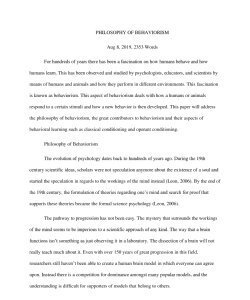PHILOSOPHY OF BEHAVIORISM For hundreds of years there has been a fascination on how humans behave and how humans learn. This has been observed and studied by psychologists, educators, and scientists b
PHILOSOPHY OF BEHAVIORISM For hundreds of years there has been a fascination on how humans behave and how humans learn. This has been observed and studied by psychologists, educators, and scientists b
PHILOSOPHY OF BEHAVIORISM
Aug 8, 2019, 2353 Words
For hundreds of years there has been a fascination on how humans behave and how humans learn. This has been observed and studied by psychologists, educators, and scientists by means of humans and animals and how they perform in different environments. This fascination is known as behaviorism. This aspect of behaviorism deals with how a humans or animals respond to a certain stimuli and how a new behavior is then developed. This paper will address the philosophy of behaviorism, the great contributors to behaviorism and their aspects of behavioral learning such as classical conditioning and operant conditioning.
Philosophy of Behaviorism
The evolution of psychology dates back to hundreds of years ago. During the 19th century scientific ideas, scholars were not speculation anymore about the existence of a soul and started the speculation in regards to the workings of the mind instead (Leon, 2006). By the end of the 19th century, the formulation of theories regarding one’s mind and search for proof that supports these theories became the formal science psychology (Leon, 2006).
The pathway to progression has not been easy. The mystery that surrounds the workings of the mind seems to be imperious to a scientific approach of any kind. The way that a brain
